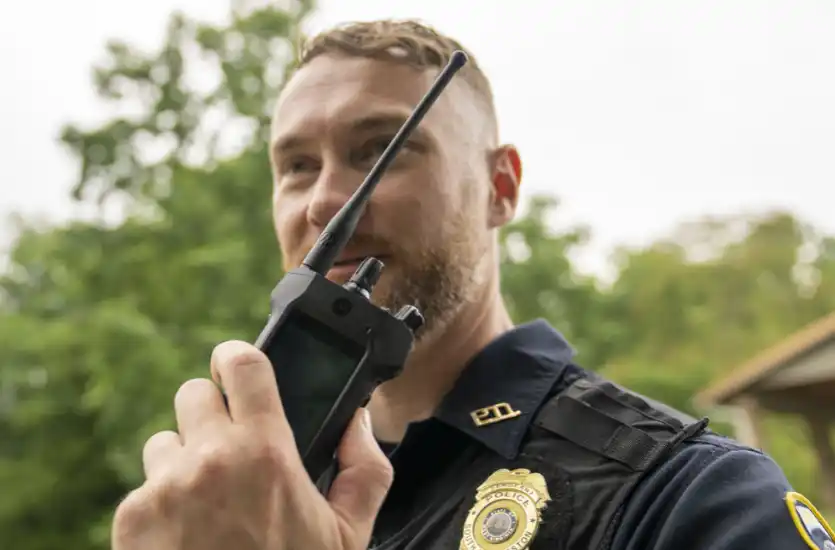In the world of two-way radios, it seems that the terms portable radios and mobile radios are used interchangeably. And while they do indeed both represent types of common two-way radio solutions, their intended use cases are quite different. In this article, the team at EMCI Wireless in central and southern Florida will tell you everything you need to know about portable vs. mobile radios so that you can make the best decision to keep your communications flowing flawlessly.
Let’s get started.
What’s the Difference: Portable vs. Mobile Radios?
Portable radios, aka handheld radios, are small, battery-powered devices designed to be carried around easily. They are perfect for use on the go and in various settings. Mobile radios, however, are bigger and installed in vehicles or fixed places. They use the vehicle’s electrical system or another power source, providing a longer range and stronger signal.
Industries like hospitality, retail, and event management (i.e., stadiums, concerts, conferences), often use portable radios because of their convenience and flexibility. In contrast, transportation, law enforcement, fire and emergency medical services, and construction sectors prefer mobile radios for their wider range and reliable performance in tough conditions.
So, with that, let’s discuss some specific use cases for both types of two-way radios so that you can choose the best solution for your business needs.
Portable Radios: Features and Benefits
As we shared above, portable radios are those that tend to be carried around by an individual. They are hand-held or can otherwise be clipped on to a uniform to allow easy movement. It’s all about convenience and mobility.
Key Features
Portable radios are known for their compact size, making them easy to carry around. Their small, lightweight design allows users to move freely without being weighed down. Additionally, portable radios are battery-powered, offering the flexibility to be used in different environments without needing a constant power source. The battery life of these radios can vary, but many modern models are equipped with long-lasting batteries that can support extended use throughout the day.
Another significant feature of these radios is their portability. As we shared, they can be easily clipped onto belts, uniforms, or carried in pockets, so they are always within reach.
Benefits in Different Scenarios
In hospitality, retail, and event management, portable radios provide the convenience of mobility. Staff can communicate without fail across large venues, resulting in easy operations and quick response times. For instance, in a hotel, housekeeping can instantly report room status to the front desk or alert security to incidents in real-time.
Portable radios help maintain safety and coordination in manufacturing and warehousing. Workers can report hazards, request assistance, and receive updates without leaving their stations.
Popular Portable Radio Models
The MOTOTRBO lineup offers many portable radio models, all known for their reliability and advanced features. The Motorola Ion is highly adaptable, combining a rugged design with smart connectivity features. The Motorola R7, available with or without a full keypad, offers clear audio and robust performance, making it ideal for noisy environments.
The Motorola R2 is another excellent choice, providing straightforward functionality with high durability. And certainly, not least, the SL3500e is sleek and lightweight, perfect for professional settings where discretion is key.

Mobile Radios: Features and Benefits
Now, let’s talk about mobile radios. These radios are typically larger (even than cell phones) and are installed in vehicles or fixed locations. Unlike portable radios, mobile radios are designed for more permanent setups and can provide greater range and power.
Key Features
One of the primary features of mobile radios is their power source. They are usually connected to a vehicle’s electrical system or an external power source, which allows them to operate continuously without worrying about battery life. This connection to a steady power supply means mobile radios can transmit stronger signals over longer distances than portable radios.
Another significant advantage of mobile radios is their range. They are equipped with higher transmission power, allowing for communication over extensive areas, which is super important for industries requiring long-range communication. The installation of these radios can vary; they are often mounted in vehicles or placed in fixed locations such as dispatch centers. The installation process involves securely fitting the radio and connecting it to an antenna to maximize signal reach and clarity.
Benefits in Different Scenarios
Mobile radios are particularly beneficial when reliable, long-distance communication is necessary. In transportation, for example, truck drivers can stay in constant contact with their dispatchers, enabling timely deliveries and quick responses to any issues on the road. Law enforcement and emergency services also rely heavily on mobile radios. Police officers, firefighters, and paramedics use these radios to coordinate during emergencies.
In construction, mobile radios allow managers and workers to communicate across large sites, improving coordination and safety. Their robust nature makes sure they can withstand tough conditions.
Popular Mobile Radio Models
Several mobile radio models stand out in the MOTOTRBO lineup. The Motorola CM200d is highly reliable and provides essential features and solid performance. The Motorola CM300d provides even better functionalities, including additional channels and programmable buttons.
The Motorola XPR 5550e and XPR 5580e models are excellent options for more advanced needs. These radios come with excellent audio quality, integrated Bluetooth, and GPS capabilities, making them helpful in environments that require advanced communication solutions. They also offer a wide range of programmable features.
Use Cases: Portable vs. Mobile Radios
Choosing the right radio for your needs can significantly impact your communication efficiency. Whether you opt for portable radios or mobile radios, each has specific advantages tailored to various industries and scenarios.
Below are examples of some use cases that highlight the strengths of Motorola two-way radio solutions for your line of work.
Portable Radios in Hospitality
- Scenario: In a busy hotel, the staff needs to communicate quickly to maintain high service standards.
- Solution: Portable radios allow housekeeping, front desk, and maintenance teams to coordinate without fail. Radios like the Motorola Ion or the SL3500e and two-way radio accessories such as earpieces and clips keep things discreet.
Portable Radios in Retail
- Scenario: A large retail store requires quick communication between floor staff, inventory managers, and security personnel.
- Solution: Portable radios such as the Motorola R2 help staff stay connected, creating an excellent customer service experience and keeping customers safe. Adding two-way radio accessories like speaker microphones can improve functionality even further.
Portable Radios in Event Management
- Scenario: At a major event like a concert or conference, flawless coordination is needed to manage large crowds and get people where they need to go.
- Solution: The Motorola R7 portable radio is super compact and offers long-lasting batteries and clear audio, making it ideal for event staff to communicate across the venue.
Mobile Radios in Transportation
- Scenario: Truck drivers and fleet managers need to communicate constantly over long distances to manage deliveries and logistics.
- Solution: Mobile radios like the Motorola CM200d provide reliable long-range communication, helping drivers stay in touch with dispatch centers and each other.
Mobile Radios in Law Enforcement
- Scenario: Police officers need a strong communication system while on patrol to respond quickly to incidents.
- Solution: Mobile radios such as the Motorola XPR 5550e offer high transmission power and advanced features like GPS tracking, so that officers can communicate clearly from the safety of their vehicles.
Mobile Radios at Construction Sites
- Scenario: Construction managers and workers need a reliable communication tool to coordinate tasks across a large site, especially where noise interference is a common problem.
- Solution: The Motorola CM300d mobile radio provides clear communication and can be installed in vehicles or site offices. Coupled with long-lasting two-way radio accessories, these radios can stand the test of time in the construction environment.

Making the Right Choice: Portable or Mobile Radios For Your Industry?
Making the right choice in the communications devices you will use for your industry is no small decision. Choosing the wrong one can mean a world of difference in completing a project on time, keeping employees safe, and even offering life-saving support to a patient or victim who has been injured in an accident.
Here are some considerations to keep in mind when deciding on the best two-way communications solutions for your business.
- Range of Communication: Consider the distance your team needs to communicate. Mobile radios are better for long-range communication, while portable radios work well for shorter distances.
- Mobility Needs: Think about how much your team moves during their workday. If they are constantly on the go, portable radios will provide the necessary flexibility.
- Power Source: Determine if you have access to a constant power source. Mobile radios can run off vehicle power or external sources, while portable radios rely on batteries that need regular recharging.
- Environment: Evaluate the work environment. Mobile radios are ideal for fixed locations or vehicles, while portable radios are perfect for varied and changing settings.
- Communication Features: Assess the specific features you need, such as GPS tracking, advanced audio options, or connectivity with other devices. Different Motorola two-way radio solutions models offer various features tailored to different industries.
EMCI Wireless is Your Partner in Choosing the Right Two-Way Communications System For Your Needs
EMCI Wireless has been a trusted provider of wireless communications solutions for over 48 years. Our industry experience and partnerships with Motorola Solutions make us the ideal partner for businesses and organizations who need wireless networks that can stand the test of time and execute without fail.
We offer all the services you will need, from system design and integration to ongoing maintenance and support. Our priority is to keep your radio network up and running at all times—your business depends on it. Let us help you determine the best solution for your needs. Request a free consultation today.






